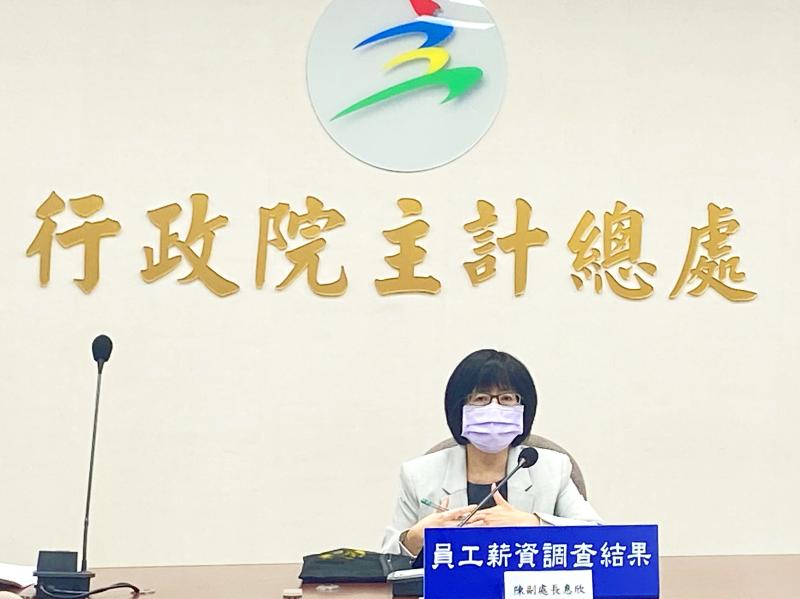The number of employees in the industrial and service sectors in August was up 0.36 percent month-on-month, as the job market began recovering from a local COVID-19 outbreak, but it has yet to fully recover, the Directorate-General of Budget, Accounting and Statistics (DGBAS) said yesterday.
The data showed the addition of about 30,000 jobs in August that raised the overall number of employees to 8.09 million, as businesses in the service sector resumed normal operations, DGBAS Deputy Director Chen Hui-hsin (陳惠欣) told a news conference in Taipei.
Lower numbers of local COVID-19 infections enabled hospitality, recreational and non-school educational facilities to reopen their businesses at reduced capacity, Chen said.

Photo: Clare Cheng, Taipei Times
“The situation is improving, though still lagging behind what it was prior to the implementation of the level 3 COVID-19 alert in May,” she said.
Hotels and restaurants added about 13,000 more employees to their payrolls, while non-school educational, social welfare and health-related facilities each hired about 4,000 more workers, she added.
The accession rate — the number of new employees added to payrolls — picked up 0.24 percentage points to 3.04 percent, while the exit rate edged up 0.41 percentage points to 2.68 percent, the report showed.
The government has maintained some restrictions, such as keeping night clubs, dance halls and entertainment venues where people cannot maintain social distancing closed, despite only two local infections being reported this month.
Meanwhile, an uptick in wages also lent support to a recovery in the job market.
The nation’s average take-home pay grew 0.76 percent to NT$43,227 (US$1,536) in August, the report showed.
The pace of the increase is the fastest since 2008, Chen said, after hotels and restaurants raised employees’ compensation by 5.42 percent, leisure and entertainment businesses hiked wages by 5 percent, and other service providers raised wages by 3.31 percent on average.
However, total monthly wages including overtime and commission-based income declined 7.58 percent month-on-month to NT$51,169 in August after electronic component suppliers issued mid-year bonuses in July, pushing up the comparison base, the report showed.
Manufacturers of notebook computers and optical devices chose to pay mid-year bonuses in August, increasing their employees’ monthly wages by 19.06 percent, it showed.
In the first eight months of the year, average take-home pay in the nation increased 1.78 percent year-on-year to NT$42,990, while total compensation grew 2.41 percent to NT$57,579, the report showed.
The real gain in total wages stood at 0.15 percent after factoring in inflation, it showed.

Taiwan’s long-term economic competitiveness will hinge not only on national champions like Taiwan Semiconductor Manufacturing Co. (TSMC, 台積電) but also on the widespread adoption of artificial intelligence (AI) and other emerging technologies, a US-based scholar has said. At a lecture in Taipei on Tuesday, Jeffrey Ding, assistant professor of political science at the George Washington University and author of "Technology and the Rise of Great Powers," argued that historical experience shows that general-purpose technologies (GPTs) — such as electricity, computers and now AI — shape long-term economic advantages through their diffusion across the broader economy. "What really matters is not who pioneers

In a high-security Shenzhen laboratory, Chinese scientists have built what Washington has spent years trying to prevent: a prototype of a machine capable of producing the cutting-edge semiconductor chips that power artificial intelligence (AI), smartphones and weapons central to Western military dominance, Reuters has learned. Completed early this year and undergoing testing, the prototype fills nearly an entire factory floor. It was built by a team of former engineers from Dutch semiconductor giant ASML who reverse-engineered the company’s extreme ultraviolet lithography (EUV) machines, according to two people with knowledge of the project. EUV machines sit at the heart of a technological Cold

TAIWAN VALUE CHAIN: Foxtron is to fully own Luxgen following the transaction and it plans to launch a new electric model, the Foxtron Bria, in Taiwan next year Yulon Motor Co (裕隆汽車) yesterday said that its board of directors approved the disposal of its electric vehicle (EV) unit, Luxgen Motor Co (納智捷汽車), to Foxtron Vehicle Technologies Co (鴻華先進) for NT$787.6 million (US$24.98 million). Foxtron, a half-half joint venture between Yulon affiliate Hua-Chuang Automobile Information Technical Center Co (華創車電) and Hon Hai Precision Industry Co (鴻海精密), expects to wrap up the deal in the first quarter of next year. Foxtron would fully own Luxgen following the transaction, including five car distributing companies, outlets and all employees. The deal is subject to the approval of the Fair Trade Commission, Foxtron said. “Foxtron will be

Taiwan Semiconductor Manufacturing Co (TSMC, 台積電) last week recorded an increase in the number of shareholders to the highest in almost eight months, despite its share price falling 3.38 percent from the previous week, Taiwan Stock Exchange data released on Saturday showed. As of Friday, TSMC had 1.88 million shareholders, the most since the week of April 25 and an increase of 31,870 from the previous week, the data showed. The number of shareholders jumped despite a drop of NT$50 (US$1.59), or 3.38 percent, in TSMC’s share price from a week earlier to NT$1,430, as investors took profits from their earlier gains